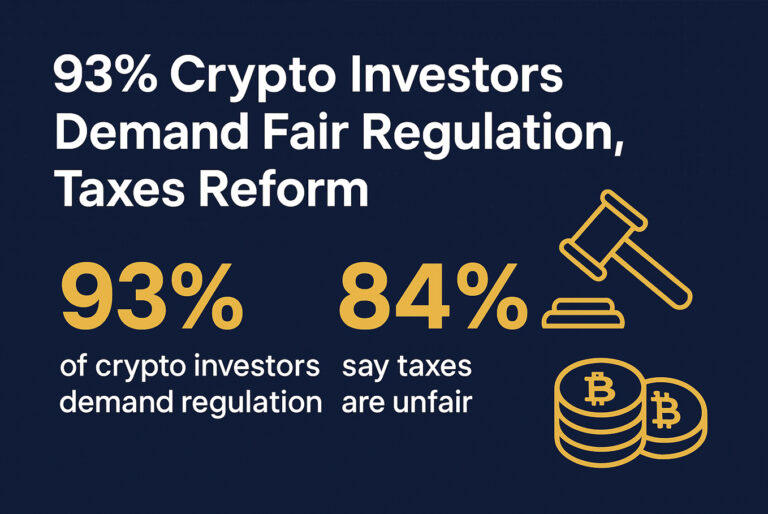Premium Biz Post – The cryptocurrency industry has entered a crucial stage where investors are pushing for fairer rules and clearer policies. According to a recent survey conducted by the digital asset platform Mudrex, 93% of crypto investors demand regulation, while 84% consider existing taxation policies on crypto investments unfair. The findings highlight growing dissatisfaction among traders and enthusiasts, emphasizing the urgent need for balanced frameworks that encourage innovation while ensuring market stability.

Investors Call for Clarity Amid Market Growth
Over the past decade, the cryptocurrency market has grown exponentially, attracting both retail and institutional investors. Bitcoin’s price surges, Ethereum’s network developments, and the rise of decentralized finance (DeFi) have turned digital assets into a mainstream topic. However, this rapid growth has also created challenges, particularly in the absence of clear government oversight.
Many investors believe that regulation would legitimize the industry and attract more institutional capital, making cryptocurrency a safer investment class. Without defined rules, traders face uncertainty and are often left vulnerable to scams, hacks, and sudden policy shifts.
Taxation Rules Spark Widespread Frustration
The survey reveals that taxation policies are a key source of frustration for crypto users. In many countries, including India, profits from cryptocurrency are taxed heavily, with additional deductions on every transaction. India’s strict tax laws, which include a 30% tax on crypto profits and a 1% tax deducted at source (TDS) for all trades, have discouraged many from participating in the domestic crypto market.
Critics argue these policies could push traders toward offshore platforms, decentralized exchanges, and non-compliant ecosystems. As a result, governments risk losing both transparency and revenue. Industry experts suggest that modernizing tax policies could encourage compliance while boosting crypto adoption.
The Global Regulatory Divide
Cryptocurrency regulation varies drastically across the globe, creating a fragmented landscape:
- United States: Regulators like the SEC and CFTC are taking a hard stance on crypto projects, but a lack of unified laws creates uncertainty for investors and startups.
- European Union: The EU recently introduced its Markets in Crypto-Assets (MiCA) regulation, providing a clear framework for consumer protection, licensing, and stablecoin operations.
- Singapore and Hong Kong: Both regions are embracing crypto innovation while implementing strict anti-money laundering measures.
- India: Despite its large crypto user base, India’s harsh taxation policies have caused trading volumes to decline, illustrating the consequences of restrictive regulations.
The disparity in global regulation complicates matters for investors who want a consistent, safe environment for trading and investment.
Read This : ”DIY Crafts & Easy Recipes for Kids Fun-Filled Creative Time”
Why Regulation Benefits the Market
While the crypto industry was built on principles of decentralization and independence, even long-time enthusiasts recognize the value of certain rules. Investor sentiment now leans toward frameworks that ensure:
- Security: Mandating security audits and compliance standards for exchanges would reduce fraud and hacking risks.
- Market Stability: Regulation can curb illegal practices like pump-and-dump schemes or wash trading.
- Institutional Participation: Financial giants are more likely to enter a market that operates under clear laws, potentially boosting liquidity and credibility.
- Legal Protection: Investors would gain legal recourse in case of scams, exchange bankruptcies, or other disputes.
Balancing Oversight and Innovation
However, there are concerns that overregulation could stifle the very innovation that makes cryptocurrency attractive. Excessively high taxes, complex reporting requirements, and restrictions on trading could drive talent and capital out of certain markets. This “brain drain” would not only harm local economies but also slow global progress in blockchain technology.
Experts advocate for a balanced approach: regulations that protect consumers while allowing crypto startups and decentralized applications (dApps) to flourish.
The Taxation Puzzle
Crypto taxation remains one of the most complex challenges. Unlike traditional assets, cryptocurrencies enable staking, lending, yield farming, and cross-border transfers. These activities complicate tax reporting and make compliance difficult for everyday users.
Some policymakers suggest adopting progressive tax policies:
- Lower rates for long-term holdings: Similar to traditional capital gains, encouraging investors to hold assets rather than speculate.
- Exemptions for small trades: Allowing microtransactions without heavy taxes would encourage using crypto as a medium of exchange.
- Simplified reporting systems: Offering automated tax tools integrated with exchanges could ease compliance.
Without reform, strict taxation risks driving crypto activity underground, undermining transparency and accountability.
Investor Sentiment Reflects Market Maturity
The Mudrex survey is significant because it reflects a shift in the crypto demographic. Early adopters valued privacy and freedom from regulation, but the market has matured. New investors prioritize safety, legal clarity, and institutional trust.
This trend indicates that cryptocurrency is moving from a niche interest to a recognized financial instrument. As more traditional financial institutions enter the market, regulation becomes inevitable.
A Call for Global Cooperation
Because cryptocurrencies are inherently global, fragmented regulations create obstacles for both users and businesses. Experts believe international cooperation is essential to create a unified set of standards addressing:
- Anti-Money Laundering (AML): Coordinated efforts to track and prevent illicit transactions.
- Consumer Protections: Global guidelines for exchange security and customer rights.
- Interoperability: Rules that encourage seamless cross-border transfers and blockchain innovation.
Countries like Singapore and Switzerland are already leading in creating crypto-friendly yet secure regulatory frameworks, setting examples for others to follow.
Public-Private Partnerships Could Be Key
Collaboration between governments and the private sector may hold the key to solving regulatory challenges. Public-private partnerships could:
- Build compliance systems that respect user privacy.
- Create innovation hubs or sandboxes where blockchain companies can test solutions under regulatory supervision.
- Educate policymakers about blockchain’s potential beyond finance, including supply chain management, healthcare, and identity verification.
Such initiatives would ensure that regulation supports long-term growth rather than hindering technological progress.
The Road Ahead
The cryptocurrency industry stands at a crossroads. Investors’ calls for fair regulation and taxation reforms present both challenges and opportunities. Countries that adopt forward-thinking policies could position themselves as global leaders in blockchain innovation, attracting investment and talent.
Conversely, failure to modernize rules could result in declining adoption, brain drain, and a thriving shadow economy of unregulated platforms.
The demand for clarity is loud and clear: cryptocurrency is no longer a fringe experiment but a legitimate financial market. With 93% of investors pushing for regulation and 84% demanding tax fairness, governments must act swiftly to create frameworks that balance innovation, safety, and growth.



